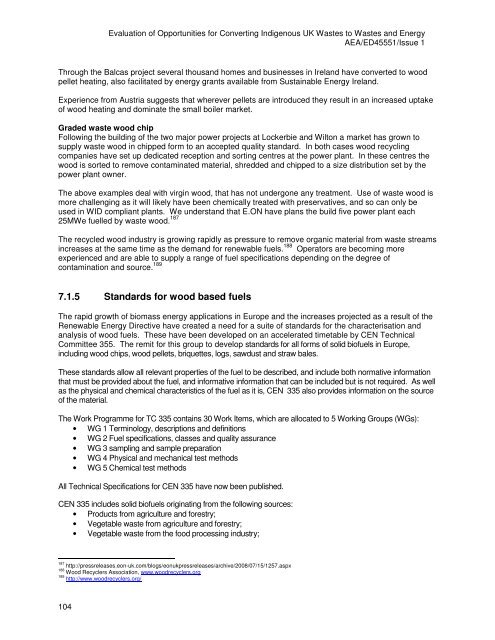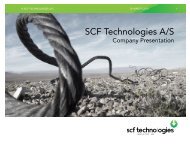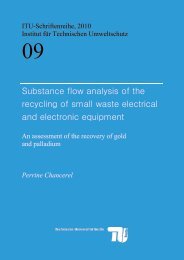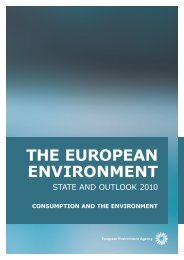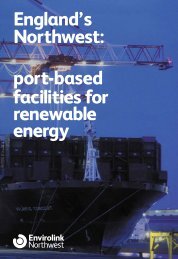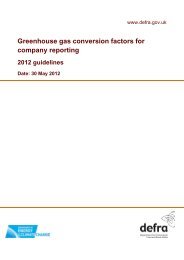to read the full report - Ecolateral by Peter Jones
to read the full report - Ecolateral by Peter Jones
to read the full report - Ecolateral by Peter Jones
You also want an ePaper? Increase the reach of your titles
YUMPU automatically turns print PDFs into web optimized ePapers that Google loves.
104<br />
Evaluation of Opportunities for Converting Indigenous UK Wastes <strong>to</strong> Wastes and Energy<br />
AEA/ED45551/Issue 1<br />
Through <strong>the</strong> Balcas project several thousand homes and businesses in Ireland have converted <strong>to</strong> wood<br />
pellet heating, also facilitated <strong>by</strong> energy grants available from Sustainable Energy Ireland.<br />
Experience from Austria suggests that wherever pellets are introduced <strong>the</strong>y result in an increased uptake<br />
of wood heating and dominate <strong>the</strong> small boiler market.<br />
Graded waste wood chip<br />
Following <strong>the</strong> building of <strong>the</strong> two major power projects at Lockerbie and Wil<strong>to</strong>n a market has grown <strong>to</strong><br />
supply waste wood in chipped form <strong>to</strong> an accepted quality standard. In both cases wood recycling<br />
companies have set up dedicated reception and sorting centres at <strong>the</strong> power plant. In <strong>the</strong>se centres <strong>the</strong><br />
wood is sorted <strong>to</strong> remove contaminated material, shredded and chipped <strong>to</strong> a size distribution set <strong>by</strong> <strong>the</strong><br />
power plant owner.<br />
The above examples deal with virgin wood, that has not undergone any treatment. Use of waste wood is<br />
more challenging as it will likely have been chemically treated with preservatives, and so can only be<br />
used in WID compliant plants. We understand that E.ON have plans <strong>the</strong> build five power plant each<br />
25MWe fuelled <strong>by</strong> waste wood. 187<br />
The recycled wood industry is growing rapidly as pressure <strong>to</strong> remove organic material from waste streams<br />
increases at <strong>the</strong> same time as <strong>the</strong> demand for renewable fuels. 188 Opera<strong>to</strong>rs are becoming more<br />
experienced and are able <strong>to</strong> supply a range of fuel specifications depending on <strong>the</strong> degree of<br />
contamination and source. 189<br />
7.1.5 Standards for wood based fuels<br />
The rapid growth of biomass energy applications in Europe and <strong>the</strong> increases projected as a result of <strong>the</strong><br />
Renewable Energy Directive have created a need for a suite of standards for <strong>the</strong> characterisation and<br />
analysis of wood fuels. These have been developed on an accelerated timetable <strong>by</strong> CEN Technical<br />
Committee 355. The remit for this group <strong>to</strong> develop standards for all forms of solid biofuels in Europe,<br />
including wood chips, wood pellets, briquettes, logs, sawdust and straw bales.<br />
These standards allow all relevant properties of <strong>the</strong> fuel <strong>to</strong> be described, and include both normative information<br />
that must be provided about <strong>the</strong> fuel, and informative information that can be included but is not required. As well<br />
as <strong>the</strong> physical and chemical characteristics of <strong>the</strong> fuel as it is, CEN 335 also provides information on <strong>the</strong> source<br />
of <strong>the</strong> material.<br />
The Work Programme for TC 335 contains 30 Work Items, which are allocated <strong>to</strong> 5 Working Groups (WGs):<br />
• WG 1 Terminology, descriptions and definitions<br />
• WG 2 Fuel specifications, classes and quality assurance<br />
• WG 3 sampling and sample preparation<br />
• WG 4 Physical and mechanical test methods<br />
• WG 5 Chemical test methods<br />
All Technical Specifications for CEN 335 have now been published.<br />
CEN 335 includes solid biofuels originating from <strong>the</strong> following sources:<br />
• Products from agriculture and forestry;<br />
• Vegetable waste from agriculture and forestry;<br />
• Vegetable waste from <strong>the</strong> food processing industry;<br />
187 http://pressreleases.eon-uk.com/blogs/eonukpressreleases/archive/2008/07/15/1257.aspx<br />
188 Wood Recyclers Association, www.woodrecyclers.org<br />
189 http://www.woodrecyclers.org/


